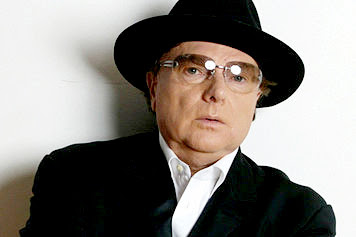
Who could ever imagine that Patti Smith (of all people) would emerge as a certain kind of pop-culture icon, if such a distinction were ever granted? Her bohemian, romantic literary swoons and the nearly-Biblical declarations of her lyrics, which seemed so cantered to the prevailing popular culture of the 1970s and day-glo '80s, are now being celebrated as the unique visions her fans always knew they were.
The mirror of art is a subjective one, and clarity comes only with the passage of time, but Patti was right all along: I got nothin' to hide here save desire, she sang on that first single in 1975, Oh, watch me now. It was her big kiss-off to her Jersey childhood, and with its lyrical echoes of the Velvet Underground a hint of the fireworks to come.
She rocked out in a way that challenged the boys-club, but she was a quick study in opposites: Easter, the 1978 album that contained her biggest chart hit "Because the Night," was graced with a cover of Patti that was guaranteed to mess with the heads of many who bought it. Even as the song climbed in the charts (the single eventually reached 13 in Billboard -- a feat in itself during the Fleetwood Mac juggernaut year of Rumours) the cover image was there to remind us that rock'n'roll, like much art, is more about surprise than expectation.
Surprise, not expectation. Patti has continued to make a career out of contradiction, long after the term "downtown art" seems often to have lost any edge at all except as a weapon in the continuing "culture wars" of the moment. Just ask David Wojnarowicz about the recent furor at the Smithsonian. Patti's punk past -- along with the participation of the Ramones, Television, and others -- has come to seem a revelation with the right three chords.
Nightclubbing is a recent documentary that manages to capture some of the 1970s New York spark that Patti helped ignite, a five-part series of performances from 1975-1980 caught on Bowery stages and compiled by filmmakers Pat Ivers and Emily Armstrong. The two brought video equipment to CBGBs and other New York clubs; some rock bands (including Patti Smith) refused to be recorded, others agreed and then changed their minds. But the two kept coming back. When Ivers and Armstrong began paying 75 cents for beers -- the artists' rate at CBGB's -- Armstrong says "they had it made."
Kim Davis of The Local / East Village profiled efforts to preserve the hours of video at the Fales Library Special Collections. The filmmakers' entire treasure trove of early NY punk (more than one hundred bands) is now being digitally transferred and added to the Fales Library, and a series of five one-hour presentations of Nightclubbing are available for screenings with an arrangement by the film-makers themselves.
The shows feature the early Heartbreakers with Richard Hell, Talking Heads, Blondie, The Cramps, DNA, the Contortions, Dead Boys, John Cale, and more. The filmmakers are asking for comments and suggestions during the ongoing restoration process. For complete details and contact information the Nightclubbing website is here, and the documentary's Facebook page is here.
While it's to be expected that artists look back on their rough-and-tumble years with a certain tough fondness, Patti's personal history since those incendiary days has been just as challenging. Patti's book is without regret, if tinged with a sadness for the loss to AIDS of so many that created her Lower East Side universe. Here is Maureen Dowd, in a New York Times column, adding to the accolades for Patti and her memoir Just Kids.

Shocking! Patti, 1978, high on rebellion: some girls don't shave
... For anyone who has had a relationship where the puzzle pieces seem perfect but don’t fit — so, all of us — “Just Kids” is achingly beautiful. It’s “La Bohème” at the Chelsea Hotel; a mix, she writes, of “Funny Face” and “Faust,” two hungry artists figuring out whom to love, how to make art and when to part.
It unfolds in that romantic time before we were swallowed by Facebook, flat screens, texts, tweets and Starbucks; when people still talked all night and listened to jukeboxes and LPs and read actual books and drank black coffee.
Smith describes the wondrous odyssey of taking the bus from South Jersey and meeting a curly-haired soul mate who wanted to help her soar, even as the pair painfully grappled over the years with Mapplethorpe’s sexuality and his work’s brutality.
“Robert took areas of dark human consent and made them into art,” Smith writes about the former altar boy from Floral Park, Queens, who was bedeviled by Catholic concepts of good and evil. “Robert sought to elevate aspects of male experience, to imbue homosexuality with mysticism.”
When he began exploring his own desires in San Francisco, she said it was an education for her too.
“I had thought a man turned homosexual when there was not the right woman to save him, a misconception I had developed from the tragic union of Rimbaud and the poet Paul Verlaine,” she writes, adding that she mistakenly considered homosexuality “a poetic curse” that “irrevocably meshed with affectation and flamboyance.”
As they redefined their love, she writes, “I learned from him that often contradiction is the clearest way to truth.” ...
(Top: Photo of videotapes by Emily Armstrong, from The Local / East Village)














